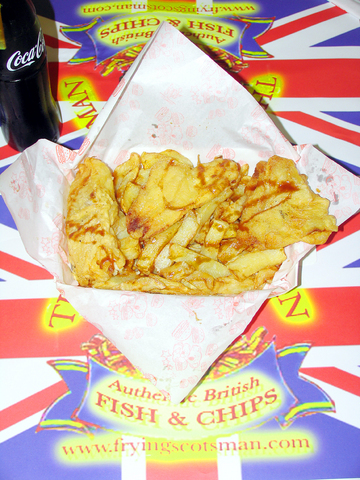A colleague's judgement after sampling the fare at this country's first "authentic" fish and chip shop was that it wasn't how he remembered the dish. The Brit is a southerner, you see, but in the north of England and Scotland they do things slightly differently. In the south fries are generally thinner and the fish is cooked in vegetable oil. Salt and vinegar are added and sometimes tomato sauce. In the North, the fish and chips tend to be larger and fried in animal fat. The sauce is brown and and the vinegar is a heavy malt.
As the name suggests, The Frying Scotsman provides a genuine sample of Scottish cuisine, from cod fillets fished out of the North Atlantic, to scotch pies and deep fried Mars bars (surprisingly good). And if the only thing missing at the moment is a can of Irn Bru to wash it down, that's coming, along with Tennants lager. In the meantime there is Boddingtons, Guiness, Stella Artois and Taiwan beer. Failing that a cup of English tea is hard to beat.
The managers at Frying Scotsman are from Falkirk in central Scotland and spent NT$2 million buying a state-of-the-art fish-and-chip fryer, the only one in Taiwan. Shipping the 4 tonnes of parts to Taiwan and getting an engineer to put them back together again was extra.

PHOTO CREDIT: JULES QUARTLY, TAIPEI TIMES
They have set up shop in the Xinyi district, in a brightly lit space that has pale yellow and blue walls, with two cherry red lamps and a flat-screen TV at the back. It's plainly not the work of an interior designer, but then no UK fish and chip shop (with the possible exception of Harry Ramsden's) is.
General manager Duncan Inglis is a former cook, paratrooper, oil rig engineer and high speed rail engineer who has settled in Taiwan and started his restaurant for the simple reason there was a gap in the market and he knew he could fill it.
Inglis said that at the opening last week, "A lady said to me, `You have just made living in Taiwan 1,000 times better. Thank you.' I want to provide a taste of Britain. I don't want to change it and make it sweeter for local tastes. I don't know whether you can change it or make it better."
As for our meal, the European cod fillet with chips was good but a bit pricey for NT$390. The cheaper Canadian cod fillet was bland in comparison. The pies received good reviews from friends who had tried them and though a little on the small side represent good value at NT$200.

Following the shock complete failure of all the recall votes against Chinese Nationalist Party (KMT) lawmakers on July 26, pan-blue supporters and the Chinese Communist Party (CCP) were giddy with victory. A notable exception was KMT Chairman Eric Chu (朱立倫), who knew better. At a press conference on July 29, he bowed deeply in gratitude to the voters and said the recalls were “not about which party won or lost, but were a great victory for the Taiwanese voters.” The entire recall process was a disaster for both the KMT and the Democratic Progressive Party (DPP). The only bright spot for

Water management is one of the most powerful forces shaping modern Taiwan’s landscapes and politics. Many of Taiwan’s township and county boundaries are defined by watersheds. The current course of the mighty Jhuoshuei River (濁水溪) was largely established by Japanese embankment building during the 1918-1923 period. Taoyuan is dotted with ponds constructed by settlers from China during the Qing period. Countless local civic actions have been driven by opposition to water projects. Last week something like 2,600mm of rain fell on southern Taiwan in seven days, peaking at over 2,800mm in Duona (多納) in Kaohsiung’s Maolin District (茂林), according to

Aug. 11 to Aug. 17 Those who never heard of architect Hsiu Tse-lan (修澤蘭) must have seen her work — on the reverse of the NT$100 bill is the Yangmingshan Zhongshan Hall (陽明山中山樓). Then-president Chiang Kai-shek (蔣介石) reportedly hand-picked her for the job and gave her just 13 months to complete it in time for the centennial of Republic of China founder Sun Yat-sen’s birth on Nov. 12, 1966. Another landmark project is Garden City (花園新城) in New Taipei City’s Sindian District (新店) — Taiwan’s first mountainside planned community, which Hsiu initiated in 1968. She was involved in every stage, from selecting

As last month dawned, the Democratic Progressive Party (DPP) was in a good position. The recall campaigns had strong momentum, polling showed many Chinese Nationalist Party (KMT) lawmakers at risk of recall and even the KMT was bracing for losing seats while facing a tsunami of voter fraud investigations. Polling pointed to some of the recalls being a lock for victory. Though in most districts the majority was against recalling their lawmaker, among voters “definitely” planning to vote, there were double-digit margins in favor of recall in at least five districts, with three districts near or above 20 percent in